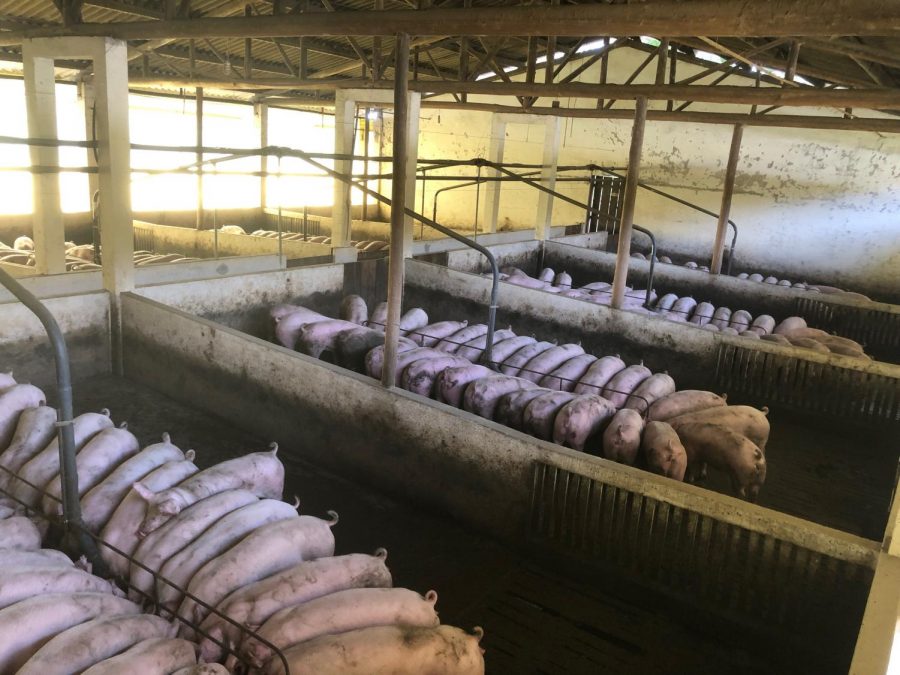Factory farming is destroying the environment
Emerson Slomka examines the dangers of factory farms.
Feb 11, 2021
In an era where discussions of ecological destruction and climate change are (rightfully) prevalent, certain facets tend to receive more scrutiny and criticism than others – we know that fossil fuel use, deforestation and waste disposal are massive issues that impact the environment, but what about the food we eat?
While agriculture is undoubtedly necessary, practices such as factory farming (an unsustainable method of livestock farming which compacts thousands of livestock into confined spaces) are not only unethical, but environmentally-damaging. With factory farming on the rise in Iowa, it’s time to rethink what’s on our plate.
According to the Food and Agriculture Organization of the United Nations (FAO), livestock farming is responsible for 14.5% of greenhouse gas emissions, with cows representing a massive 65% of that number due to their methane emissions. Deforestation and land destruction are also huge issues caused by factory farming. Approximately 897 million acres of land in the United States are used for farming, with around 260 million acres of forests being cleared in order to grow food for livestock. Yes, out of all the grain produced in the United States, 70% of it is used solely to feed livestock.
Perhaps the most shocking result of livestock farming has been the Gulf of Mexico “Dead Zone,” an area filled with toxic algal blooms that deplete oxygen from the water and restrict life in the area. A study by environmentalist group Mighty Earth identified the source as being fertilizer pollution caused by Tyson Foods, America’s largest meat company. A report by Environment America indicated that Tyson Foods is responsible for some of the largest numbers in waterway pollution – besides being No. 1 in agricultural pollution, they are ranked only behind AK Steel Holding Corp in terms of overall waterway pollution, having dumped more than 104 million pounds of waste into waterways between 2010 and 2014.
For those of us dealing with Iowa’s poor water quality, perhaps this fact is a grim reminder of the source. The high nitrate levels in Iowa’s drinking water – nitrates which can lead to cancer when consumed at high levels — are a direct result of pollution caused by farming.
While the effects of factory farming can be seen globally, perhaps they’re most visible in Iowa, where pig farming plays a major role in the economy, Iowa being the largest producer of pork in the United States. As the pork industry expands, so do factory farms, and poor legal regulations practically encourage unethical practices. A 2020 PBS article by John Flesher chronicles how many Iowa farmers bypass regulations by finding legal loopholes or by simply not getting legal approval in the first place. When pressured to inspect, the Department of Natural Resources discovered 4,200 previously-unknown farms in Iowa – that’s 4,200 unregulated farms. Of course, for Iowans living in the vicinity of these massive pig farms, there are health risks. According to Dr. Steve Wing of the University of North Carolina, the odorant chemicals produced by factory farms can lead to health issues such as high blood pressure, and others have reported respiratory issues, rashes and eye irritation.
What exactly can we do to combat factory farming? On a larger scale, putting stricter regulations in place and ceasing to subsidize factory farm operations would massively impact the industry. On a smaller scale, however, we can protest with our wallets, refrain from buying and consuming animal products, thus taking away funds from factory farming operations.
It sounds like a massive undertaking, but it doesn’t have to be overnight. Incorporating things like Meatless Monday, and slowly replacing animal products in your diet with plant-based ones over time can smooth the transition into a more ethical, sustainable lifestyle. Plant-based eating is becoming more and more accessible and widespread – since 2014, there has been a 600% increase in veganism and vegetarianism in the United States, and the plant-based food industry has become incredibly profitable, with most stores and even some restaurants stocking vegan alternatives. In order to challenge the factory farming industry, we need to make big changes, both in our government and in our own lifestyl
















